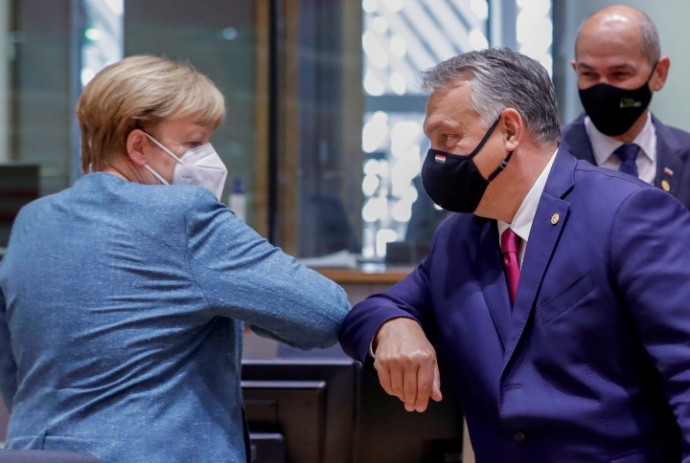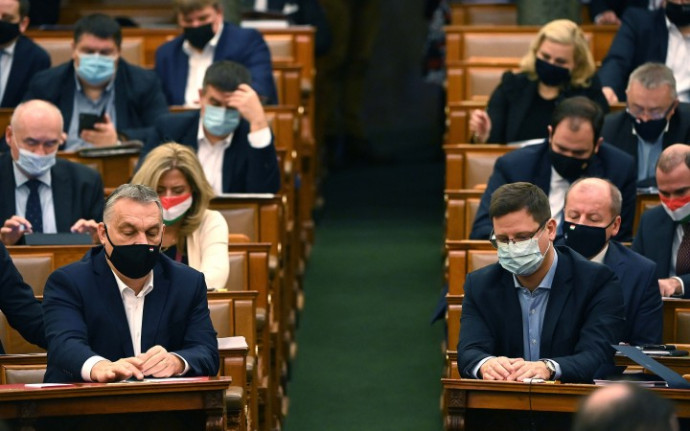
2021 has kicked off with a recession of historic proportions and an unprecedented loss of popularity for Fidesz. This year, Hungarian Prime Minister Viktor Orbán will be facing tough battles against the European Parliament and the United States of America, while his challenger is expected to emerge from the opposition by the second half of the year. On top of the external factors, Orbán has things to do in his own party as well before the upcoming parliamentary elections next year.
2020 has been the worst year for the Hungarian economy since 2010, but a couple of weeks ago, György Matolcsy, the Chairman of the Hungarian National Bank, even said that last year could be amongst the worst 5 in the past 100 years. The recession in the wake of the coronavirus pandemic could have reduced the 2020 GDP by as much as 6%, and that is something that the population already feels: Since June, the Hungarian consumer confidence index has plummeted, people perceive their financial situation increasingly worse, and that correlates with the popularity of the Hungarian governing coalition Fidesz-KDNP:
According to pollsters Závecz Research, Fidesz has lost more than half a million voters since August.
If support for Orbán moves closely together with the economic circumstances (as has been the case for the past ten years), then the PM's hopes for this being only temporary may not be unfounded. As the current economic crisis was artificially initiated by governments to curb the spread of the pandemic and to keep infections below levels that the healthcare system could still handle, most experts expect the recovery to be quicker than it had been after the 2008 Great Recession.
Projections by the Hungarian National Bank and the IMF both show that Hungary could be looking at economic growth this year once again, and according to GKI Economic Research Co., the Hungarian economy could be back to its 2019 levels as early as 2022. The recovery is further strengthened by the fact that Hungary will, in the end, partake in the European Union's NextGenEU coronavirus recovery package, although much depends on how quickly sectors most affected by the pandemic can be rebooted and if tourism and the hospitality industry can be up and running by the summer season.
The government expects that several thousand Euros worth of EU tenders could be announced by this March possibly setting the economy back on track, but the cabinet refrained from making any specific estimates as it all depends on when mass vaccination could begin and how it would progress.
While the economic outlook does have a major effect on the government's popularity, next years elections will not be decided by the numbers alone: Economic growth during the 2019 municipal elections was actually above the EU average, yet Fidesz has lost most major cities.
Illiberal populism in the crosshairs
2020 was not exactly Orbán's best year in foreign policy, but 2021 is shaping up to be even worse. The Hungarian PM had bet everything on Donald J. Trump's victory at the 2020 US presidential race. Trump's defeat was bad news for right-wing populists all over, but Orbán, who always spoke of the President as someone he can rely on in his crusade against abnormality, has one of his most important allies in the international scene.
Besides the symbolic loss, there are also practical aspects; during the Trump administration, Orbán could crack down on NGOs and transform the country's media landscape without the USA batting an eye, but based on experience, that state of grace is most likely over, as we have explained in our video before the US election:
But besides Orbán's history with the second Obama administration, other signs are also foreshadowing an increase in US efforts to protect democratic systems in allied countries, Joe Biden's appointments to the State Department also point in this direction. The father of Biden's pick for Secretary of State, Anthony Blinken, had vocally stood up against the ousting of US-based Central European University from Hungary, and Blinken himself is known to be a great proponent of major world powers like the US spreading the idea of democracy.
Biden's national security advisor is no reason for Orbán to get his hopes up either; Jake Sullivan, describing the hardening of US foreign policy, said that "the exposure of corruption by leaders of foreign countries" could be an effective tool to combat populists declaring illiberal programs. And the poster-boy for illiberalism is none other than Viktor Orbán, who swore to ditch liberal democracy in favour of building an illiberal one at his party's annual Tusványos summer festival in 2015.
Germany could be humming a new tune as well
The most important development for Orbán in European politics is that he lost his most important MEP, József Szájer. The man whose sex scandal made global headlines was said to be the peacemaker in Orbán's constant conflicts with Fidesz's European political family, the European People's Party. A similar loss is Péter Gottfried, who was another important background figure in Brussels but has retired from European diplomacy to focus on his work in the Hungarian Monetary Council. Besides Szájer, another embarrassing moment of last year was that Fidesz MEP Tamás Deutsch was suspended from the EPP Group for his comments comparing group leader Manfred Weber to the Gestapo.

In the meantime, there is still no end in sight to Fidesz's feud with the EPP that has been going on for nearly two years, the Hungarian party is still suspended in the political family. Most recently, Orbán offered the EPP a new type of loose cooperation, while Donald Tusk said Fidesz just does not fit in the largest European political group. If Fidesz was expelled from the EPP, that would be a humiliating procedure and a major loss of prestige, but more importantly, Orbán would lose much of his leverage in Europe, and Fidesz could only join a less significant group in the European Parliament – or one that is completely insignificant, as signified by MFA Péter Szijjártó's early December round trip visiting representatives of the Dutch Freedom Party, the Danish People's Party, the Finn's Party, and the Italian League. A far cry from sitting with German CDU and CSU.
If the US election was a crucial point of 2020 for Orbán, then Germany finding Angela Merkel's successor will be a life or death situation. The German Chancellor played a key role in convincing Orbán to withdraw his veto of the EU's next seven-year budget and the rule of law conditionality, and Orbán's relationship with the German top brass fundamentally determines his possibilities in Europe.
In the meantime, the rule of law mechanism has entered into effect on 1 January 2021, and though there is much uncertainty, it already seems sure that the Hungarian PM is facing a major conflict in the European Parliament that already made it clear that if Hungary or Poland turns to the European Court of Justice to revise the mechanism, they would request a summary procedure, preventing a years-long delay in its application.
Hungarian public opinion is slowly changing
Probably the most important development of 2020 on the domestic front last year was the Szerencs by-election. The parliamentary seat of the constituency surrounding the small town in Borsod-Abaúj-Zemplén county was vacated after the Fidesz MP Ferenc Koncz's tragic, fatal motorcycle accident, and the governing party nominated the late MP's daughter, Zsófia Koncz. But the election's significance was that it was the first time the opposition alliance was tested live, and despite the unfortunate candidate (whose racist and antisemitic comments were revealed only after his nomination), it was a close race in the massively Fidesz-supporting constituency, which opposition pundits found to be a reason for optimism.
Even though Fidesz managed to retain their razor-thin supermajority by winning in Szerencs, the structure of Hungarian domestic politics had forever been altered: Opposition parties managed to come to an agreement and will have joint candidates in all constituencies, a joint list, a joint program, and a joint candidate for Prime Minister.
By the end of the year, public opinion also took a very unusual turn: More and more pollsters found that an opposition alliance has a real fighting chance against the government, and that is a first since 2010.
(And that is a first even if the governing coalition's popularity saw major dips for instance in 2015, when the Internet Tax, the US entry ban scandal, and a major uproar over the luxurious lifestyles of some public officials really hurt Fidesz, as back then, the opposition was still fragmented and did not stand a chance against the monolithic governing coalition.)
On top of that, Fidesz does not project much confidence either: In the autumn, it was revealed that ministers Gergely Gulyás and Mihály Varga, and other prominent members of Fidesz such as communications chief István Hollik or Máté Kocsis will not be nominated in their usual constituencies in the capital next year, which may signify that Fidesz has already given up on Budapest – and with that, the chance for their fourth consecutive supermajority in the Parliament.
Hundreds of millions of what?
One of the great questions of 2021 in Hungarian domestic politics is whether or not Fidesz will bend election rules in their favour even further. Analysts and opposition politicians say that the supermajority empowers the governing party to do pretty much anything, although that could be a double-edged sword. Election rules already accommodate Fidesz, if they change them even further, that carries the risk of mobilising opposition voters and losing the undecided vote.

Also this year, the opposition will hold their primaries, which, as the 2019 municipal elections have shown, are quite capable of mobilising voters and activists, setting opposition parties onto campaign mode and thematising the public discourse. According to current plans, the opposition primaries should conclude by the autumn of 2021, meaning that Orbán could have a challenger ready within nine months.
But the opposition alliance is one thing – Fidesz will also have to set the tone for their 2022 campaign this year. One of the elements is already there: Former Prime Minister Ferenc Gyurcsány will most likely be a returning bogeyman, useful for attacking the joint list of the opposition, chipping away at the alliance's support, and scaring away undecided voters, while Gyurcsány is the exact red cloth Fidesz should wave if they want to get their supporters to the polls. The first signs of this industrial-grade Gyurcsány-bashing were already showing at last year's final weekly press conference of the government, where the PM's Chief of Staff Gergely Gulyás spent more time on talking about Gyurcsány than any other topic, describing him as the "most corrupt man in Hungarian politics."
Though the question of Fidesz's main campaign message remains open. At the start of 2020, the government started building up a National Consultation on the "causes hurting the Hungarian sense of justice" which was ultimately washed away by the pandemic. It was clear as far back as then that Orbán and his party are trying to pinpoint issues where opposition voters could likely be on the same platform as them. The coronavirus will probably remain a hot topic in a major part of 2021 too, and it seems unlikely that the government would turn back to topics such as the prison compensations which were already settled by legislation last year.
But an election wonder weapon similar to the utility cost reduction in 2014 or migration in 2018 is yet to appear, however, we can surely expect copious amounts of scaremongering about George Soros and migration until 2022. As Orbán's cabinet minister Antal Rogán said in the middle of Decembe
"These disputes will go on. Nobody withdrew the migration action plan, they still want to give 34 million migrants voting rights and a place to live, the gender action plan will come up a hundred million times as well, we will keep on fighting."
Orbán's policies are centred around safety, and the protection of Christian culture and normality could play a major role there. But even though the communications director of Fidesz says the scandal of Fidesz MEP József Szájer "did not deter the governing coalition a single bit," that central narrative will be a tough sell after their main man in the European Parliament was caught in Brussels climbing down a drainpipe with drugs in his backpack while fleeing a police raid on an all-male orgy.